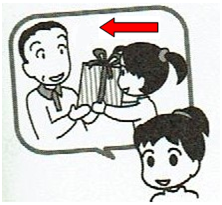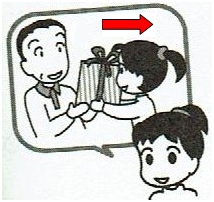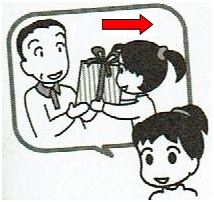私 + は/が + 人 + に + 物 + を + あげます。
I give something to someone.
Question: What do you do for your family’s birthday?

✔「person + に + thing + を + あげます。」is used when you give something to someone.
✔ Use 「に」for someone or「を」for something as postpositional particle.
例: 私は父にプレゼントをあげました。
Eg: I gave a present to my father.
-
私は友達にプレゼントをあげます。
I give a gift to a friend. -
私は恋人に花をあげます。
I give flowers to my lover. -
私は母にカードをあげます。
I give a card to my mother.
人 + は/が + 私 + に + 物 + を + くれます。
Someone gives me something.
Question: What does your family do for your birthday?

✔ What we learn in Unit2-1 and Unit 2-2 are the same meaning. But 「 I + に+ thing + を + くれます。」is used when someone is giving something to you.
✔ For postpositional particle, use 「に」for someone or 物「を」for something.
例: 父は私にプレゼントをくれました。
Eg.: My father gave me a present.
※ For「私 + に+物+ を + くれます。」,「物」sometimes refers to「返事 (response)」「メール (mail)」 .
例1: 小泉さんが、なかなか返事をくれないので、困っています。
Eg.1: Koizumi doesn't reply me, which makes me confused.
例2: 先生、(私に)メールをくれましたね?
Eg.2: Teacher, did you send me E-mail?
※ When you received something at a chance or occasion”, use partical「に」as in 「chance/occasionに」.
例1:この本、親せきのおばさんが誕生日プレゼントにくれました。
=親せきのおばさんが誕生日プレゼントにこの本をくれました。
Eg.1: I got this book for birthday present from my aunt.
Explaination:
What I got is book.「誕生日プレゼントに」means「as birthday present 」.
In short, this sentence means「My aunt gave me the book as birthday present.」.
例2:この指輪、亡くなったおばあちゃんが合格祝いにくれたんです。
=亡くなったおばあちゃんが合格祝いにこの指輪をくれたんです。
Eg.2: I got this ring for celebration from my late grandmother.
Explaination:
What I got is「this ring」.「合格祝いに」means「for celebration of passing the exam」.
In short, this sentence means 「My late grandmother gave me this ring for celebration of passing the exam.」
-
山田さんは私に日本語の本をくれました。
Mr. Yamada gave me a Japanese language book. -
張さんは私に国のお菓子をくれました。
Mr. Zhang gave me dessert from his country. -
この本、親せきのおばさんが誕生日プレゼントにくれました。
My aunt gave me this book for my birthday. -
この指輪、亡くなったおばあちゃんが 合格/卒業/就職 祝いにくれたんです。
My deceased grandmother gave me this ring for celebration/graduation/getting a job.
私 + は/が + 人 + に + 物 + を + もらいます。
I receive something from someone.

Same as Unit2-1 and Unit2-2, it means someone giving a present to another.
✔ 「I + は/が + person + に + thing + を + もらいます。」is used when speaking from the viewpoint of someone receiving a present.
✔ For postpositional particle, use 「に」for someone or 「を」 for something.
例: 私は父にプレゼントをもらいました。
Eg.: I received a present from my father.
✔ Use「いただきます」 instead of 「もらいます」 when someone giving you a something is “above” you (like company president, teacher, elders).
例: 私は先生にプレゼントをいただきました。
Eg.: I received a present from a teacher.
-
私は兄に新しい服をもらいました。
I received a new cloth from my brother. -
おつり/今月の給料/ボーナス/領収書/資料 は、もうもらいましたか。
Did you already receive the change/monthly pay/bonus/receipt/reference material? -
A:これ、どうぞ。
B:ありがとうございます。じゃ、一ついただきます。A: Here you go.
B: Thank you. I’ll have one more. -
A:これ、どうぞ。
B:すみません。じゃ、遠慮なく/少し いただきます。A: Here you go.
B: Thank you. I’ll have it. /I’ll have some.
普通形 + そうです。
I heard
Situation:
You watched weather forecast on TV today. In it, tomorrow’s weather is predicted to be sunny. When you arrived at school, your friend asked you,
「明日の天気を知っていますか。」
“Do you know tomorrow’s weather?”
What is your answer?
✔ When the speaker tells you news or other information he/she learned from newspapers, magazines or word-of-mouth, use 「plain form+ そうです。」.
例: 明日は晴れるそうです。
Eg.: I heard it’ll be sunny tomorrow.
✔ Connection:
|
(plain form) verb(dictionary form、たform、ないform) |
|
+ そうです |
|
(plain form) い-adj (「い」) |
|
|
|
(plain form) な-adj (「 |
|
|
|
(plain form) noun + だ |
例1: 来週の土曜日に花火大会があるそうです。一緒に見に行きませんか。(V-辞書形)
Eg.1: I heard there will be a firework event next Saturday. Shall we go and see it? (V-dictionary form)
例2: さっき、北海道で地震があったそうですよ。(V-た形)
Eg.2: I heard there was an earthquake at Hokaido just before. (V-たform)
例3: 青木さんは明日来ないそうです。(V-ない形)
Eg.3: I heard Mr. Aoki will not come tomorrow. (V-ない form)
例4: トムさんはアルバイトで忙しいそうです。(い-adj)
Eg.4: I heard Mr. Tom is busy with his part-time-job.
例5: 田中さんはサッカーが好き な だそうです。(な-adj)
Eg.5: I heard Mr. Tanaka likes palying soccer.
例6: 学校は休みだそうです。(名詞)
Eg.6: I heard the school will close. (noun)
-
彼は 欠席する/風邪だ そうです。
I heard Mr. Smith will be absent/got cold. -
明日は晴れるそうです。
I heard it’ll be sunny tomorrow. -
電車が遅れているそうです。
I heard the train is running late. -
電話番号が違うそうです。
I heard it’s a wrong telephone number.
Notice:
_:Blank
